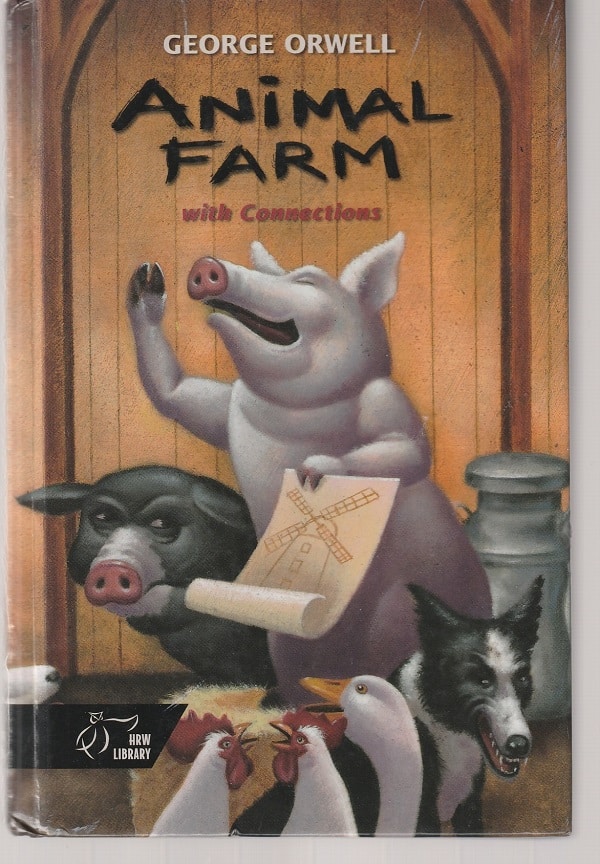“Oh, I read that — in high school, I think,” the waitress said as she saw me with George Orwell’s 1945 novel Animal Farm.
“Yeah, I might have even read it in grade school,” I said. “It’s different reading it now. Back then, it was all about Communism. Now, it’s about….well, everything.”
Animal Farm was less than two decades old when I read it sometime in the early 1960s, but it was already a classic. That was, in part, because it was heavily promoted by our elders as a total indictment of the Soviet Union and its totalitarian form of Communism.
There’s no question that Orwell, who died in 1950, patterned the events in his short novel on the Russian Revolution and on the resulting government that evolved into a top-heavy, brutal regime based on lying and terror. It seemed made-to-order for the rabid anti-Reds in America in that era, and Orwell’s fable-like simplicity in telling the story meant it was assigned to an entire generation to preteens and teens.
I suspect, however, that, had he lived longer, Orwell would have been chagrined at how his novel had been pigeon-holed as an anti-Communist tract — because it isn’t.
How power corrupts
Orwell’s simplicity of language isn’t a dumbing down of the story to make it palatable for children. There is genius in the way he walks the reader through the tale, and, if it seems easy to read, that, I’m sure, is because Orwell wanted everyone, including adults, regardless of their education, to be able to take it in.
It is a modern fable, a parable, a story to teach a lesson. And the lesson is about more than Russian Communists.
It’s a lesson about how power corrupts, no matter the situation.
In the novel, the animals on Manor Farm revolt against Farmer Jones and win possession and control of the farm. And, the next day, they gather on a knoll from which they can see their shared domain:
Yes, it was theirs — everything that they could see was theirs! In the ecstasy of that thought they gamboled round and round, they hurled themselves into the air in great leaps of excitement. They rolled in the dew, they cropped mouthfuls of the sweet summer grass, they kicked up clods of the black earth and snuffed its rich scent.

Echoes any revolution
Over the next hundred pages, the pigs who led the revolt — Napoleon and Snowball, and their spokesman Squealer — gather more and more power unto themselves. The two leaders have a falling out, and Snowball is chased away, lucky to survive with his life. The Seven Commandments that were promulgated in the aftermath of the rebellion are increasingly adjusted to the benefit of Napoleon and the other pigs, and their dog allies.
One of the most shocking developments is the line of animals who are forced to confess to crimes against the farm and are immediately executed. Then, Boxer, the steadfast, salt-of-the-earth workhorse, breaks down with age and overwork and is sent off to the knacker’s to be killed and turned into glue.
The story fits the first half century of the Soviet Union, but it also echoes what happens in any rebellion, whether the French Revolution or the American Revolution or ones still to come.
The idealism at the beginning of a revolt has to do with equality, but that equality will soon fade away as those with power use their power. As Napoleon eventually tells the other animals in the form of a new commandment that replaces the earlier ones:
“ALL ANIMALS ARE EQUAL
BUT SOME ARE MORE EQUAL THAN OTHERS.”
A warning
As Animal Farm details, those in power keep control by using their power for that purpose. They also use propaganda and terror and statistics and high ideals and outright lies.
Orwell’s novel is not just a fable. It is also a warning to the multitudes of any nation that those in power will do whatever they can get away with in order to stay in charge.
Oh, you may say, it hasn’t happened here in the United States in the way Orwell as written. It won’t happen here. It can’t happen here.
Of course, it has been happening, as anyone paying attention can attest to.
One last note: There’s no happy ending to Animal Farm.
Patrick T. Reardon
7.4.23
Written by : Patrick T. Reardon
For more than three decades Patrick T. Reardon was an urban affairs writer, a feature writer, a columnist, and an editor for the Chicago Tribune. In 2000 he was one of a team of 50 staff members who won a Pulitzer Prize for explanatory reporting. Now a freelance writer and poet, he has contributed chapters to several books and is the author of Faith Stripped to Its Essence. His website is https://patricktreardon.com/.
